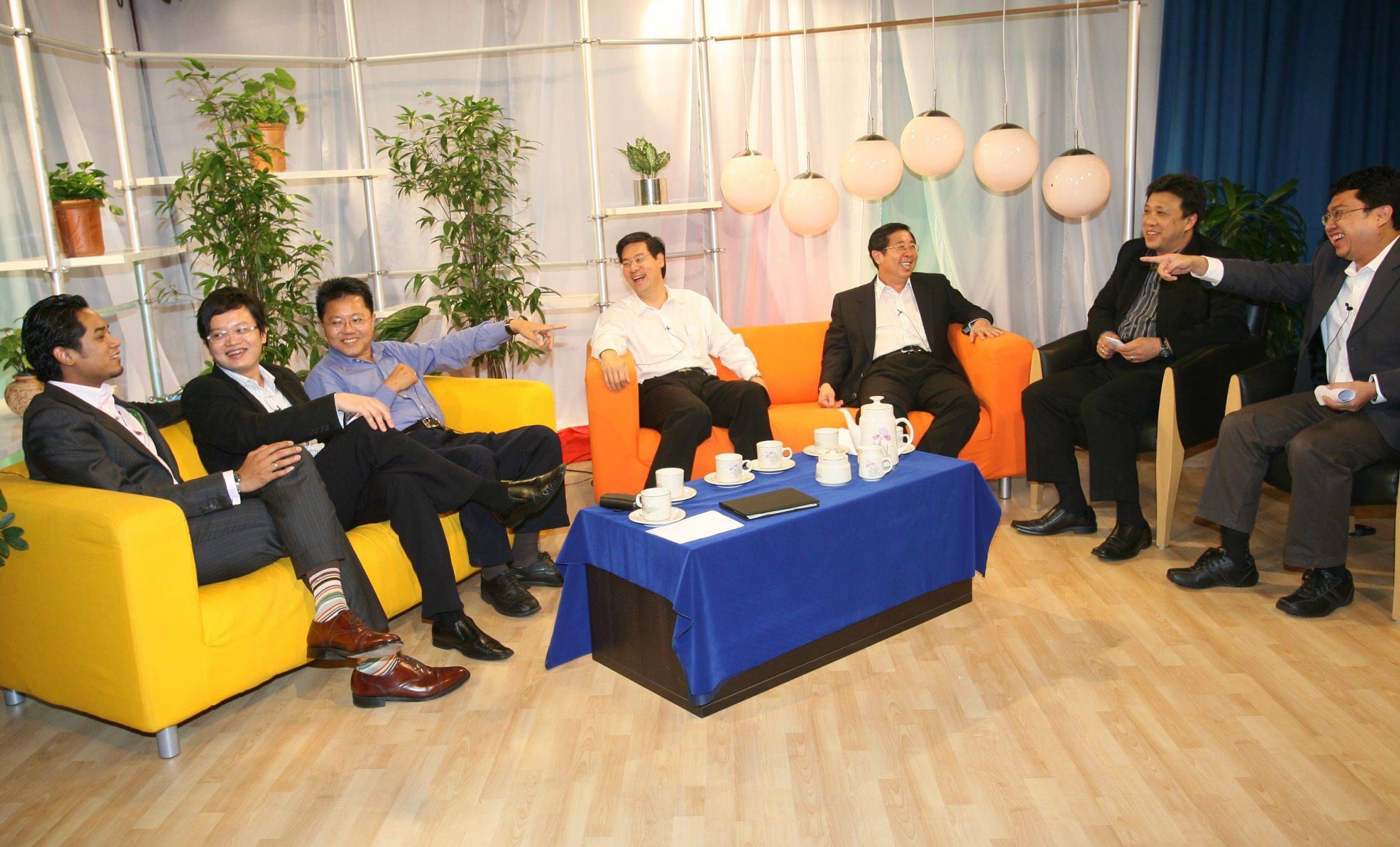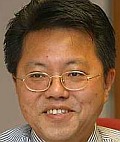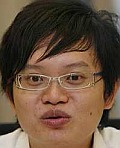Sunday December 2, 2007
Bloggers, Politics and The Elections ![]() View video
View video
When Malaysians next go to the polls, they will no longer be wooed solely by conventional campaign methods.
The emergence of the multimedia in the political landscape will see the Internet being used in an unprecedented way to persuade voters and win votes. They will range from blogs and websites on the Internet to the ubiquitous sms' and, more recently, self-made videos on YouTube and social networking on Facebook.
 |
|
Lighter moment: The panellists (from left) Khairy, Khoo, Ooi, Nai Chee, Chia, Chun Wai and Raslan sharing a joke.
|
The second round of Café Latte Chats chaired by The Star's acting group chief editor Datuk Wong Chun Wai explores this new force on the political landscape.
The panellists who turned up at The Star's recording studio were an interesting mix of personalities. They are Deputy Information Minister Datuk Seri Chia Kwang Chye, Kota Melaka MP and lawyer Wong Nai Chee, Umno Youth deputy chief Khairy Jamaluddin, DAP's e-campaign director and blogger Jeff Ooi, Sedar Institute director Khoo Kay Peng and The Star Online editor Raslan Shariff.
 |
Chun Wai: The general election could be just a few months from now. Will conventional methods of campaigning play second fiddle to the Internet in the general election?
Chia: It will increase and the potential is great, but that it will be dominant, I beg to differ. I see a greater potential on Youtube because a video says everything without having to explain. That kind of online content has impact. The blogger influence will also be big on younger voters because a recent survey shows that 75% of those under 25 go online. But to control blogs is close to impossible because of the very nature of the technology. I see more bloggers and blogs in the next general election.
Talk, not shout?
Chun Wai: There has been more democratic space than before, but Malaysians are still grappling with the idea of speaking up – people in cyberspace often shout, unable to discuss, using inflammatory language, calling names and making allegations. On the other hand, there are the older politicians who are fearful of this new medium and unable to see the need for greater expression.
 |
Nai Chee: The Government is still trying to live with this new development. We are still in the infancy stage but one of the guarantees of the Multimedia Super Corridor (renamed MSC Malaysia) was to not curb Internet content except maybe using certain legislation to control the situation.
The Internet is a global trend and we have to spend a lot more effort on the medium because you have to deal with information not found in the conventional media. I remember the alleged corruption of a deputy minister in the Internet and it caused such a hoo ha. We can't control it, we just have to acclimatise ourselves to it.
Ooi: There are two extremes in the media ecosystem. But describing Malaysia as more liberal compared with 22 years of the Mahathir era, I think that is not by design, more by accident. Bloggers, news portal like Malaysiakini thrive because they play a complementing role to what are official mouthpieces. They have changed the pattern of news and information.
But you need credibility to command trust, you need to substantiate what you claim. I do not condone bloggers who hide behind anonymity, use inflaming words and so on. It's so peculiar in Malaysia that when you throw hard questions, it's the old school ministers who respond negatively. It will take a few more years for people to accept the Internet as a form of life such as in the first world.
Chun Wai: People question the objectivity of the mainstream media but no one seems to question bloggers who make allegations and are proven wrong, like all those allegations made about you, Khairy.
 |
Khairy: The opening up of the media space is by a conscious design of the government after the 2004 elections, not by accident. The level of tolerance for organisations like Malaysiakini to go into official press conferences and grill ministers is much greater than before.
I'm not a participant or blogger per se, but if you have the “Top of the Pops,” I'm probably No.1 almost every month or week when it comes to being the victim of blogs. But I take it as fair game as this is an entirely new medium. The veracity or credibility of information and blogs is sometimes suspect, so you have to take it with a pinch of salt.
Blogs are increasingly important but you have to see it in the context of Internet penetration. The impact is going to be limited in the coming elections but it's going to sway voters in three or four elections to come. I come from the biggest political party in Malaysia whose strength lies in the rural sector. Information there comes from ceramah, opposition papers and mainstream media.
Chun Wai: Some bloggers think their views reflect that of the rest of the country. People sometimes believe what they want to believe.
Khoo: I think that happens on both sides. Some bloggers are opinion makers, they create certain information, other bloggers pick it up and the voice suddenly seems huge. The government side seems hostile to what bloggers do but there is also a great deal among politicians in the government. But generally, there aren't many people with original opinions, good views or substantiated statements.
 |
The Internet and the Rural Voters
Raslan: When I balik kampung, people there hardly go into the net or go for the sort of news urban people go for. Cyberspace gets a disproportionate amount of attention because of the government reaction. We have four million people on dial-up and a further one million on broadband, mainly in urban areas. The National Broadband Plan wants to wire up 50% of households by 2010. Maybe the political impact of the Internet will be greater in the elections after that.
Chun Wai: Are parties like Umno, Gerakan or MCA paying more than just lip service to multimedia?
Chia: Only 20% of those who access blogs read political blogs. Opposition parties have been more active in this alternative media. The ruling party is lagging behind because of their comfort level with the traditional media. But it's going to be more important for us in the future.
Nai Chee: It's not so much about access to rural people but more about people's priorities. Rural priorities are still very much bread and butter issues – electricity, water, cost of living. The majority of bloggers are addressing urban middle class issues.
Khairy: As far as Umno is concerned, I think we are not doing enough. That is an admission on my part. I don’t think there is any Umno leader who runs a blog, maybe Shahrir on and off. That is something we need to rectify quickly. The technology is still something that is alien to the Umno leadership and that is something we have to correct.
The impact of blogs on the rural electorate cannot be dismissed because of the process of osmosis and it is possibly something that needs our attention. There was on Malaysia-Today, which everyone knows is a strongly-opinionated portal, these chronicles, a fantastical, fictional account of this guy who had the same name as me, and it was made into a book that was printed in English and Malay and distributed at the Umno general assembly.
Something created online could actually make its way into the rural heartland via Umno delegates. There is a process of conversion, from what is taking place in urban domain into rural domain. But it's basically still a small ecosystem. If you look at the responses posted to blogs, its quite incestuous, basically the same people with the same opinions. I'm taking it in the context of what is said about me every week, every month, recycled arguments from last year or the year before.
What the government parties are doing – I know the MCA and Gerakan are quite active in courting online space simply because contest is in urban seats.
Chun Wai: The mainstream media always has to think of libel, unlike bloggers who get away with a lot of things. Many people don't realise that when they read things on the Internet that may not appear in the mainstream media. The major newspapers are public listed companies and they are easy targets. Very few want to sue bloggers.
 |
Ooi: We also get defamation suits. The ground rules are the same for the mainstream media and bloggers and we are pretty fine with it. I always say that if you want to say your piece, substantiate it. And be ready always to face the consequences in court. That has definitely seeped in among up and coming bloggers.
Take Rocky's Bru, in the last 18 months, his traffic has almost equalled or surpassed mine. People who reveal their identity command respect and credibility and help you touch the hearts of your constituents. But there are so few political bloggers who can be considered reliable in terms of evidence and subject matter.
I foresee blogs playing a role but it will be a footnote role and in a way that uses a convergence of multimedia forms. For example, PAS has videos on Harakah daily and within three days, they are converted into DVDs and distributed to the masses. When you are so limited, you have to be resourceful. But first and foremost, you must have credibility.
Legal actions, bloggers and mainstream media
Chun Wai: Khairy, all sorts of things have been written about you in blogs but you have not sued them.
Khairy: I choose not to take legal action because politically, it puts more attention on the blog which is precisely what they want. As a politician, the moment I start suing somebody, I’ll be suing somebody every day because people say things about you every day. You can't go to court every time somebody says an untruth about you. You use whatever channels you think are credible and tell your side of the story. That is the cut and cross of politics. But sometimes you have to go to the courts. Anwar is suing me over a speech I made in Kuala Kangsar. He obviously hasn’t come up to deny what I had to say, he decided to take it to court. I'm not crying about it, this is a grown-ups' game.
Chun Wai: You have moved from blogging into politics and you will likely be contesting in the elections. Someone will come along and challenge you and say, Jeff, what credibility are you talking about?
Ooi: I think I’ll let my record show. What will be tough is how do we reconcile one's profile as a blogger with that of your constituents. You are not going to have an ideal situation where you only talk to the educated or Internet-savvy. The problem with bloggers is that most of them are talking to the converted. They pontificate about the power of blogs but do not know how to move beyond that small sphere. That is the major challenge.
There is a formula towards making blogs less lethal. The moment the Printing Presses and Publications Act is withdrawn and Malaysian media can behave the way journalists operate, then blogs will be rendered ineffective. That is food for thought.
 |
Khoo: The perception is that the Government does not want to engage, they want to do things in a closed-door manner without publicity. This mindset has to change because the Internet is all about engagement. When bloggers blog about something, they get immediate responses, whether the reader agrees or disagrees.
Khairy: Many of these political blogs for their own reasons take a very strong stand against the Government. So if you ask if we are willing to engage, yes we are. But it's very difficult because many of the postings and editorialising in these blogs suggest that it can become very personal.
Take for example, Rocky's Bru. It is no secret that Rocky started this Bru after he left one news organisation. He was very angry, cynical and had a chip on his shoulder and that is reflected through his blog. As for Jeff, his blog has evolved, then Jeff made that step to become a DAP member, to say he is going to contest in the elections. All well and good because we know where he's coming from.
You can engage with people, but you must also understand where they're coming from, their history and background, the axes they have to grind. I would much prefer that we create our own domain and ecosystem so that people can see what we are doing. If they like it, they can stay and comment. If you don't, they can go. That is the power of the Internet, free choice.
Ooi: The growth of blogs in the last three years goes to show the ground has moved, that people are not afraid to voice and share opinions and feelings. They are not being anti-government, they are pro-Malaysia. Bloggers are not there to pontificate but to provide context to issues in a world of information explosion. Treat bloggers with respect that they will do their research and come to their own conclusion.
The digital division – government and bloggers
Chun Wai: Bloggers must be responsible for what they write, when civil actions are taken against them, they claim it's an infringement of their expression.
Khoo: It's all about perception – I think on both sides there is wrong perception and each views the other with great distrust. Bloggers will say government is not credible and vice-versa. Political approach has to change, from government and opposition. The Government has to be willing to create its own domain and engage with people because the Government can enable change. When that happens, freedom of expression won't be the main focus anymore. If outlets are legitimate, open and flexible, I'm sure in time the truth will surface.
Chun Wai: The need to change, to open up, is taking place. When will we actually see ministers and deputy ministers adopt an open view of things?
 |
Chia: I think the situation will change. Younger politicians will go more and more into blogs and engage online. I see the trend already. If we don't move along, we will drown. To survive, a lot of people will go in.
Raslan: There is still a lot more to be done on both sides. Education for bloggers and people who read blogs. More and more Malaysians want to be treated as equals on an intellectual level and not in a feudal structure. More and more, people don't want to be talked down to. They want to be engaged on the same level. Once we have that, mutual respect on both sides, then we will find a way out.
Conclusion
Chun Wai: We can conclude that this election will be the beginning of what has been regarded, in many developed countries, as the 'Google election' era. It may not have a strong impact but for certain, in the coming years, we will see a greater convergence of the print and online video. The new generation of Malaysians have used online access as a major communications tool. The older politicians find themselves vulnerable but there is no running away from it. The younger generation also believes that a bigger democratic space is the way forward.
Compiled by Royce Cheah and Paul Choo
BIODATA OF PANELLISTS
|





